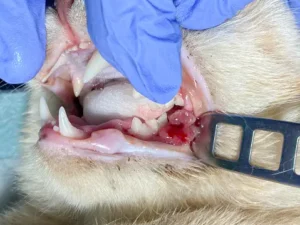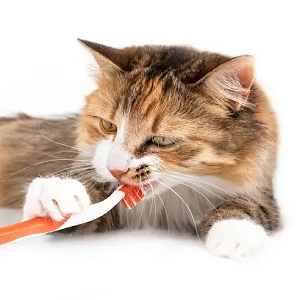Dental disease is a common health issue in cats, just as it is in humans. It refers to a range of dental problems that can affect a cat’s oral health, including periodontal disease, gingivitis, tooth decay (cavities), and other dental abnormalities. Dental disease can cause pain, discomfort, and lead to more serious health problems if left untreated. Here are some key points about dental disease in cats:
Causes of Dental Disease in Cats:
- Plaque Formation: Like humans, cats produce saliva, which contains bacteria. When food particles, saliva, and bacteria combine, they form a sticky film called plaque that adheres to the surfaces of the teeth.
- Tartar Formation: If plaque is not removed from the teeth, it mineralizes and hardens into tartar (also known as dental calculus). Tartar is a hard, yellowish-brown substance that firmly attaches to the teeth, particularly near the gumline. Once tartar forms, it provides a rough surface that encourages further plaque buildup, creating a cycle of worsening dental disease.

- Gingivitis: As plaque and tartar accumulate, they irritate the gums, leading to inflammation known as gingivitis. Gingivitis causes the gums to appear red, swollen, and sensitive, and it can be painful for the cat.
- Periodontal Disease: If left untreated, gingivitis can progress to periodontal disease, which involves the destruction of the tissues that support the teeth. This includes the gum tissue, periodontal ligament, and the surrounding bone. Periodontal disease can lead to tooth mobility and, eventually, tooth loss.
- Dental Abnormalities: Some cats may be predisposed to dental issues due to genetic factors. For instance, certain breeds may have dental abnormalities that increase the risk of dental disease.
- Age: Dental disease becomes more common as cats age. Senior cats may be more susceptible to dental problems due to years of plaque and tartar buildup.
- Diet: The type of diet a cat consumes can influence dental health. Cats that primarily eat soft or wet food may be more prone to plaque and tartar accumulation compared to those on a diet that includes dry kibble, which can help mechanically clean the teeth.
- Lack of Dental Care: Insufficient dental care, such as infrequent or inadequate teeth cleaning, can accelerate the progression of dental disease in cats.
- Chronic Health Conditions: Certain medical conditions, such as feline immunodeficiency virus (FIV) and feline leukemia virus (FeLV), can weaken the immune system and make cats more susceptible to dental disease.
I Hope You Like This: 5 Important Things About Kidney Disease in Cats
Symptoms of Dental Disease in Cats:
- Bad breath (halitosis): Persistent bad breath is one of the most noticeable signs of dental issues in cats. The foul smell is caused by the accumulation of bacteria in the mouth.
- Difficulty eating: Cats with dental disease may experience pain while eating. You may notice your cat dropping food, chewing on one side of the mouth, or taking longer to finish meals.
- Pawing at the mouth: Cats in pain may paw at their mouths or rub their faces against objects to alleviate discomfort.
- Drooling: Excessive drooling can occur due to inflammation and pain in the mouth.

- Bleeding gums: If you observe blood on your cat’s toys or food, it could be a sign of inflamed or infected gums.
- Swollen or red gums: Inflamed gums (gingivitis) may appear red, swollen, and sore.
- Reluctance to eat hard food or toys: Cats with dental issues may avoid crunchy food or toys because chewing can be painful.
- Weight loss: Dental pain can deter cats from eating, leading to weight loss or reduced appetite.
- Changes in behavior: Cats in pain may show changes in behavior, such as increased irritability or reluctance to be touched.
- Pawing at the face: Cats may paw at their faces to signal discomfort in their mouths.
Risk factors of Dental Disease in Cats:
- Age: Dental disease becomes more prevalent as cats age. Older cats are more susceptible to dental issues due to the accumulation of plaque and tartar over time.
- Poor Dental Hygiene: Just like in humans, poor dental hygiene is a significant risk factor for dental disease in cats. If regular brushing or dental care is not practiced, plaque can build up on the teeth, leading to gingivitis and periodontal disease.
- Diet: The type of food a cat consumes can influence dental health. Soft or wet food may stick to the teeth more easily and promote plaque formation, while dry kibble can help clean the teeth through mechanical action.

- Breed: Certain cat breeds may be more predisposed to dental issues. Brachycephalic breeds (with short, flat faces) like Persians and Scottish Folds may have dental crowding or misalignment due to their unique facial structure.
- Genetics: Some cats may have a genetic predisposition to dental disease, making them more susceptible to gum problems and tooth decay.
- Tooth Alignment: Malocclusion (misalignment of teeth) or retained deciduous (baby) teeth can lead to overcrowding, making it harder to keep the teeth clean.
- Tobacco Exposure: Exposure to tobacco smoke has been associated with an increased risk of periodontal disease in cats.
- Health Conditions: Certain underlying health conditions, such as feline immunodeficiency virus (FIV) and feline leukemia virus (FeLV), can weaken the immune system, making cats more susceptible to dental disease.
- Lack of Regular Check-ups: Cats that do not receive regular veterinary check-ups may miss early signs of dental issues, allowing problems to progress further.
- Poorly Maintained Dental Treats or Toys: Dental treats and toys can be helpful in promoting oral health, but if they are not kept clean or are of poor quality, they may contribute to dental problems.
May You Want To Know This: 12 Important Effects of Skin Fungal Infection In Cats
Prevention:
Preventive care is essential to maintain your cat’s dental health. Regular dental check-ups with a veterinarian are crucial to catch any dental problems early. You can also take steps at home to prevent dental disease, such as brushing your cat’s teeth with a cat-specific toothbrush and toothpaste, providing dental treats or toys, and feeding a diet designed to promote dental health.
Treatment:

If your cat already has dental disease, treatment may involve a professional dental cleaning under anesthesia to remove plaque and tartar, extraction of severely damaged or infected teeth, and antibiotics to treat any infections. In advanced cases, treatment may also involve dental X-rays to assess the extent of damage below the gumline.
Complications:
Untreated dental disease can lead to more severe health issues, such as tooth root abscesses, oral infections, and even systemic health problems affecting the heart, liver, and kidneys due to the spread of bacteria from the mouth.
Remember, it’s essential to consult with your veterinarian if you suspect your cat has dental issues or for advice on preventive care. Regular dental check-ups and good dental hygiene can go a long way in keeping your feline friend’s mouth healthy and pain-free.
Do You Want To Know: 8 General effects of calicivirus?
Conclusion:
The conclusion regarding dental disease in cats is that it is a prevalent and significant health issue that requires attention and proper care. Dental disease is a common problem among domestic cats, affecting the majority of adult cats over the age of three. The primary cause of dental disease in cats is the accumulation of plaque and tartar on their teeth, which leads to various oral health problems. Dental disease is a common and significant health concern for cats, but with proactive dental care and regular veterinary visits, it can be prevented, managed, and its impact minimized to ensure the overall well-being and quality of life of our feline friends.
FAQ’s:
Q: What causes dental disease in cats?
The primary cause of dental disease in cats is the buildup of plaque and tartar on their teeth. This occurs due to a combination of food particles, saliva, and bacteria that form a sticky film on the teeth.
Q: What are the symptoms of dental disease in cats?
Cats with dental disease may exhibit symptoms such as bad breath (halitosis), difficulty eating, pawing at the mouth, drooling, bleeding gums, swollen or red gums, and reluctance to eat hard food or toys.
Q: Are certain cats more at risk of developing dental disease?
Yes, certain factors can increase a cat’s risk of dental disease, including age (older cats are more susceptible), poor dental hygiene, diet, breed (brachycephalic breeds), genetics, and health conditions weakening the immune system.
Q: Can dental disease lead to other health problems in cats?
Yes, untreated dental disease can lead to more severe health issues, such as tooth root abscesses, oral infections, and even systemic health problems affecting the heart, liver, and kidneys due to the spread of bacteria from the mouth.
Q: How can dental disease in cats be prevented?
Preventive care is essential. Regular dental check-ups with a veterinarian, at-home teeth brushing, providing dental treats or toys, and feeding a diet designed to promote dental health can help prevent dental disease in cats.
Q: What does treatment for dental disease in cats involve?
Treatment may involve professional dental cleaning under anesthesia to remove plaque and tartar, extraction of severely damaged or infected teeth, and antibiotics to treat infections. Dental X-rays may be used to assess the extent of damage below the gumline.
Q: Why is dental hygiene important for cats?
Dental hygiene is crucial for cats to prevent dental disease, reduce the risk of related health issues, and improve their overall well-being and quality of life.
Q: Can I use human toothpaste for brushing my cat’s teeth?
No, human toothpaste contains ingredients that are toxic to cats if ingested. Use cat-specific toothpaste, as it is safe for them.
Q: How often should I take my cat to the veterinarian for dental check-ups?
It is recommended to have your cat’s teeth checked by a veterinarian annually or more frequently if they have a history of dental issues.
Must Visit For More Knowledge: Vetpomedix.com
Also Read Can Parrots Eat Chicken?



nice content thanks for sharing
Hey people!!!!!
Good mood and good luck to everyone!!!!!
Hey people!!!!!
Good mood and good luck to everyone!!!!!